In 1908, more than 15,000 women marched in NYC demanding more appropriate working hours, better pay and voting rights. Three years later in 1911, Clara Zetkin, the leader of the Women’s Office for the Social Democratic Party in Germany, suggested that there should be a celebration of women every year in every country. International Women’s Day was honored for the first time in European countries including Denmark, Germany and Switzerland on Mar 19, 1911. This tradition did not become official until 1975 when the United Nations started celebrating it. In 1949, after the founding of the People’s Republic of China, the government has recognized International Women’s Day and made it an official holiday. China celebrates International Women’s Day every year in several ways, including granting women a half day off work, discounts on women’s products, and much more.
Chinese working women get a half day off work
According to Article 3 of the “National New Year’s Day and Memorial Day Holidays” document promulgated by the State Council of China, Women’s Day is a holiday for some citizens, and women are eligible for a statutory half-day holiday.
As the tradition becomes more and more popular and China has made great strides toward gender equality in the 21st Century, many companies are providing female employees with additional benefits. For instance, it is increasingly common for women to receive gifts from their company, along with handwritten cards showing appreciation.
On a weirder note, one company gave their female employees underwear washing machines.
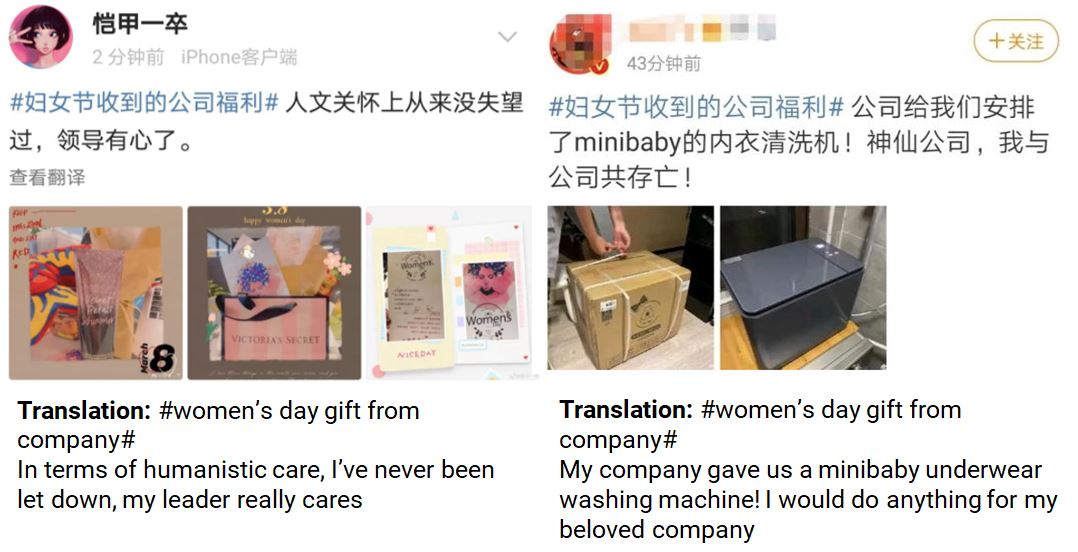
Source: topic “gifts received from my employer on Women’s Day” on Weibo, Weibo, 2020
How brands and products celebrated International Women’s Day in China
Proya
Proya, one of the trendy Chinese skincare brands, has stood out because of its partnership with China Women’s Daily this year. A two-minute-long video was published online on March 7th criticizing gender stereotypes for both men and women and striving for feminism to mark International Women’s Day. Surprisingly, a state-run organization like Women’s Daily would be a part of this campaign, considering that the Chinese government has been reinforcing the controversial, yet deeply rooted masculinity culture in recent years.

Source: Proya’s subject search index, Baidu index, March 2021
This video has received 27,000 and 39,000 reposts from Proya’s official Weibo account and Women’s Daily account, respectively. According to Baidu Index, Proya’s subject search index rose by 50%. It is safe to say that the positive feedback from the campaign is positively associated with the increasing sales data. The sales revenue on March 8th (a day post the video being published) was 12.77 million RMB, which is approximately a 30% increase from the sales revenue of 9.80 million RMB on March 6th, a day before the video was posted.
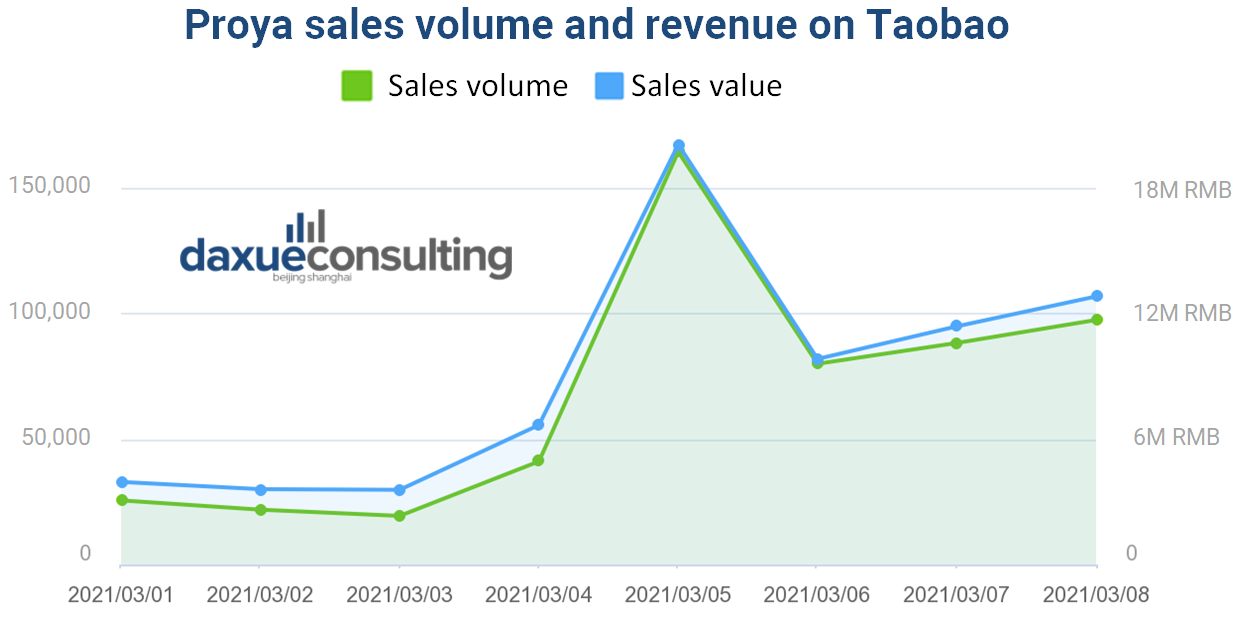
Source: Proya’s sales volume and sales revenue, taoshuju (淘数据), March 1-8, 2021
In addition to this campaign, Proya also had a “buy 1 get 2” promotion on multiple products for Tmall’s Women’s Day shopping event. Its sales peak happened right on the first day of the 3-day long event, achieving sales revenue of 20 million RMB, a 201% jump from the previous day’s sales revenue of 6.64 million RMB.
NEIWAI
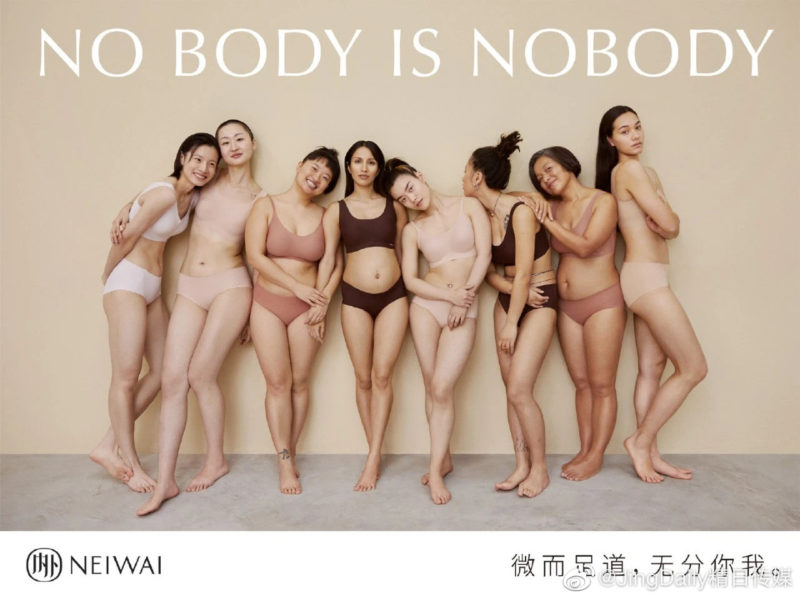
Source: International women’s day campaign by NEIWAI, weibo, 2021
NEIWAI, literally translated as “inside and out”, is premium lingerie, lounge and active wear brand founded in Shanghai, China. The 2021 IWD campaign named “No Body is Nobody” was featured on multiple platforms such as Xiaohongshu (小红书), Weibo and WeChat. This campaign focuses on more profound issues behind the “diversity” label, such as body image anxiety, and actual acceptance towards different skin tones, body shapes, age and place of origin.
“Body image” has been a big issue nowadays on social media in Asia. Starting with the popular Brandy Melville girls trend last year as BM opened their first shop in China, the clear preference towards skinnier bodies has been intensified in the society and there was not enough emphasis on the fact that health should be the priority regardless of body shapes. Following the campaign, many women have shared the importance of “allowing ourselves to be ourselves” (“允许自己作为这样的自己存在”). Increasingly more Chinese women are realizing the power they have to own their identities, breaking open the century-old beauty standards.
This campaign was posted on March 1st, 2021, and according to Baidu Index, the brand keyword search index experienced a substantial increase of 86% from 259 on Feb 28th to 482 on March 1st. The topic “no body is nobody” on Weibo has attracted over 14.24 million views. NEIWAI also participated in Tmall’s Women’s Day shopping event. According to taoshuju, it received a total of 7.56 million in sales revenue on March 5th, the first day of the event, compared to a sales revenue of 1.72 million the day before.
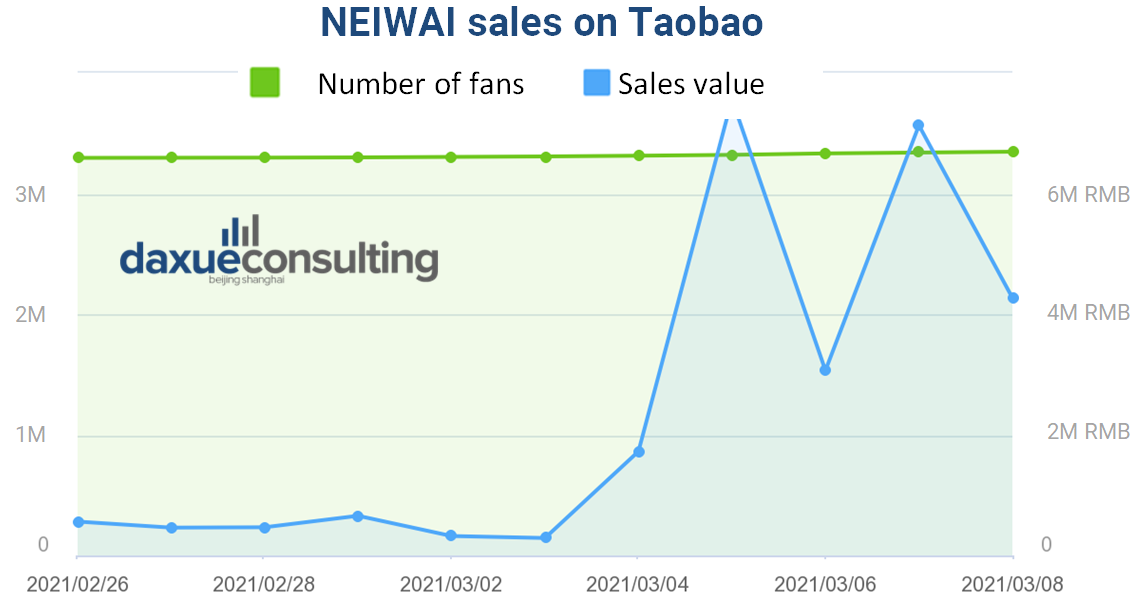
Source: NEIWAI’s sales revenue, taoshuju (淘数据), Feb 26-March 08, 2021
The greatest discount of the year for feminine hygiene
Pads are usually the most discounted product on International Women’s Day in China. On both Tmall and JD, in addition to the promotion discount, various brands will also distribute their discount coupons. For example, the original price of Kotex 80-piece day and night combo is 199 RMB. However, during the Women’s Day event on JD.com, when the total price of feminine hygiene products chosen by the customer is greater than 199 RMB, then this customer would directly receive a hundred RMB off from the JD platform and also receive a 10 RMB coupon from Kotex shop page, which makes the final price come out to be 89 RMB.
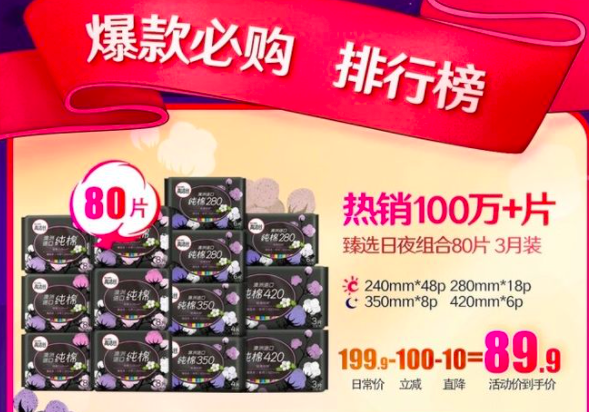
Source: Kotex’s product promotion page, JD.com, 2021
International Women’s Day in China: What netizens say
1. The controversy surrounding “goddess festival” (女神节)
Some people believe the Chinese word Fu Nv (妇女), which is the word for ‘Women’ used in ‘International Women’s Day’ has a negative connotation as it is often used for married and elderly women. To avoid this term, retailers have started to take advantage of the occasion of the festival to create a “Goddess Festival”, which replaces the Chinese word ‘Fu Nv’ with ‘Goddess’, or in Chinese, 女神 pronounced Nv Shen.
However, in 2021, many netizens now stand against replacing “women” with “goddess” (女神). As a festival that commemorates and celebrates women who are hard-working, who strive for economic security and quality of life, the use of the term “women” is far more powerful and respectful than the empty titles invented by the retailers.
2. A much more diverse discussion regarding women’s rights
In the past, topics or discussions on social media regarding International Women’s Day in China would not go in more depth than “happy international women’s day!” In the past, few had studied the history or purpose of Women’s Day.
However, there is a noticeable shift to a more meaningful, and in-depth discussion about how women are still disadvantaged in society. The photos underneath are examples of such discussions: the first video repost explains “slut-shaming” and the manipulation and attack that women receive from their counterparts regarding how they dress.
At the beginning of the video, a woman was wearing a V-neck t-shirt, and the man standing beside her said “you are asking for it”, as if the woman was trying to sexually attract him though she wasn’t. She decided to satirize the lack of respect by showing up in a wedding dress the next day in her boyfriend’s house and said the same line “you are asking for it” although clearly, they weren’t planning on getting married.
The video underneath covers the mistreatments that women experience daily in interviews and the job market overall. In the video, the young nurse was more than qualified for the position she applied for, but was told by 3 male interviewers that “this job may not be for women”; the female doctor criticized her subordinates for underperforming at their jobs, and overheard that “she lost her temper probably because she has got her periods or not enough sexual life”; another surgeon posted a sexy photo on social media and the most liked comments were “how can I trust a doctor who dresses like this?”. In the latter part of the video, the video shows the idealistic solution in which three women confronted the male counterparts and dealt with them confidently.
However, the ending shows the reality: women are still told to be silent to trivialize the problems. The comment sections are flooded with comments along the lines “this is so relatable”, “this is so representative of our society” and some users are even willing to share their own stories. Such communication paints a fuller picture for everyone to see the existing stigma in our society and that there is a lot of work that needs to be done to improve.
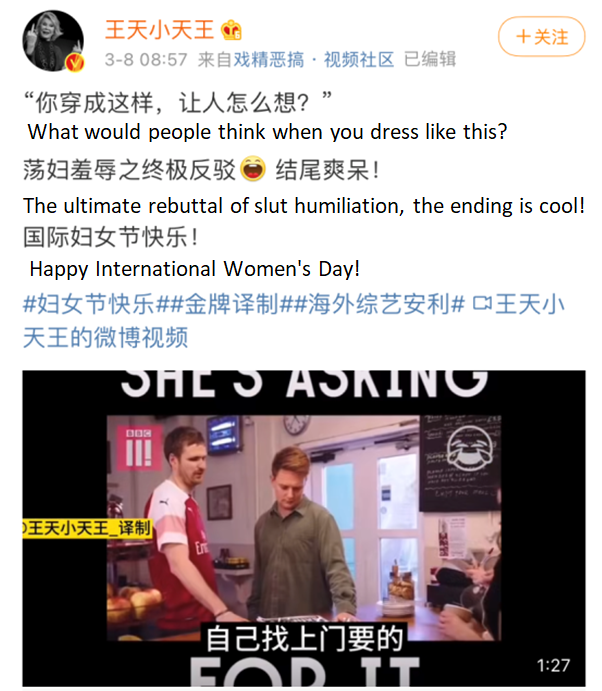
Source: Weibo, a “slut-shaming” satire, 2021
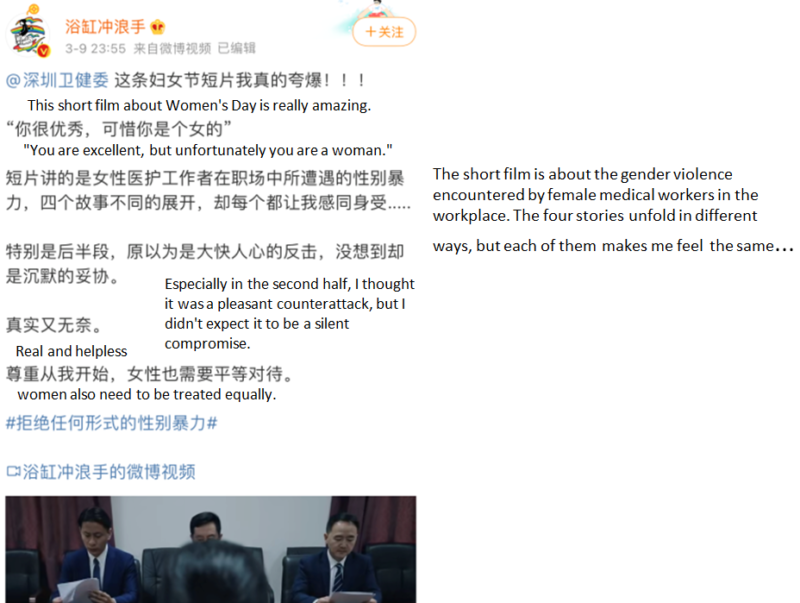
Source: Weibo, a video criticizing gender inequality in the job market, 2021
Can “women’s day” and “goddess day” co-exist?
As employers are paying more attention to providing benefits for their female employees on Women’s Day, and brands invest in campaigns that strive to fight against the deeply rooted gender issues, it seems that we are shifting in the positive direction to a society with less overall gender inequality or stigma. However, such a festival can never escape from retailers who try to use this opportunity to attract female customers into female-dominated shopping sectors such as personal hygiene, makeup and clothes.
In reality, any social improvement relies on economic activities. To illustrate, NEIWAI and Proya both target female customers and rely on them to make profits. If we think the other way around, such influential campaigns would not have been possible without their investments, and thus potential reduction of gender inequality or stigma would have been a lot more difficult to achieve without the widespread messages. In other words, for the improvement of social issues, consumers and businesses are inseparable from each other to a certain extent —– they co-exist.
What China’s celebration of International Women’s Day can teach us
- Superficial campaigns risk getting backlash. Brands marketing to Chinese women should prove they actually do support women’s rights by authentically empowering women.
- In China, International Women’s Day is also an important day for companies to show gratitude for their female employees. Not only do women get a half day off work, but more and more companies are sending gifts to employees.
In terms of gender equality, the focus has shifted from getting equal opportunities to also include getting treated equally in those opportunities. This means not only hiring women, but following through with treating them respectfully at work. In terms of marketing, this means cutting out all body shaming, slut shaming, and any other form of sexist marketing. Some brands take the next step to satire these backwards practices.
Learn something new? Stay updated on the Chinese market by following our WeChat, scan the QR code below, or subscribe to our newsletter

Learn more about China’s digital ecosystem, see our report on WeChat mini-programs
Listen to over 100 China entrepreneur stories on China Paradigms, the China business podcast
Listen to China Paradigm on Apple Podcast






